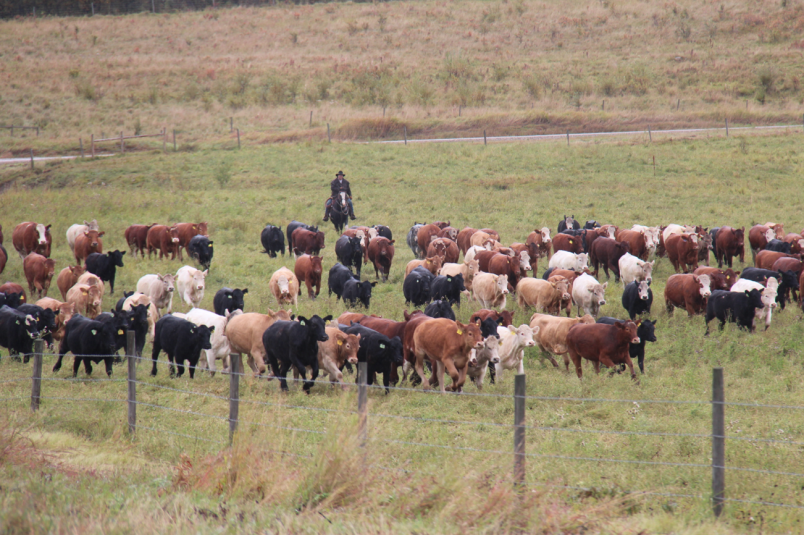The Peace River Regional District (PRRD) board expressed harsh criticism today of a new provincial report on the future of B.C.'s food system.
The report was prepared for Premier John Horgan by the Food Security Task Force. The board's complaints centered around the United Nations push for plant protein-based farming, and the lack of understanding of the unique challenges faced by the agriculture industry in northeast B.C.
“The red flag, first thing off the top, was when recommendation number one was that we have to follow the UN sustainable development goals," said director Leonard Hieber, a Peace River farmer.
"We’ve been producing food for the last 200 years, so that means obviously we don’t know what we’re doing. So, we have to be told by a global entity that we got to change things to make it work.”
Hiebert disagreed with the report's assertion that crop yields will be down by 25 per cent by 2050 because of climate change.
“I think we’ll be at the yields where we need to be, we'll just be doing them differently,” he said. “The way my grandfather farmed in the 60s and 70s is totally different than the way than I do it currently. It doesn’t mean our yields are less, it just means we’re doing it differently to accomplish those yields we need.”
Other directors agreed with Hiebert's criticisms.
The report suggests the establishment of vertical farming, with greenhouses stacked inside buildings. It's a farming method that has never been tried in the northeast as most farming is traditionally done with fields for grain production.
Organics and large-scale crop production are just two areas the region excels in, said director Dan Rose.
He called the report disappointing, and said it missed including the issues raised by the region's producers, including market access, horticulture development, and limited broadband connectivity. The report was light on stakeholders and geared toward small agriculture, he said.
“There’s not much that we talked about that’s reflected in this report,” said Rose. "It seemed very, very dismissive of the large agri-business that we have in our area as being that important; more focused on niche markets, organics, and those kinds of things."
Director Karen Goodings said the report's focus on shifting from livestock protein to plant protein crops will impact on cattle producers.
“I don’t know about you guys, but I’m not into plant protein hamburgers. If I want to eat a hamburger, I want to eat a hamburger, I don’t want to eat soybeans,” said Goodings, drawing laughs from the board.
“This report is centred around plant protein. It cuts out our ag industry as far as our beef goes.”
The three-person Food Security Task Force is composed of Arvind Gupta, a professor of computer science at the University of Toronto and UBC; Lenore Newman is the Director of the Food and Agriculture Institute at the University of the Fraser Valley; and Peter Dhillon CEO of the Richberry Group of Companies, an agribusiness enterprise with operations in British Columbia and Quebec.
A reading of the Task Force report gives an indication of why it is meeting with such disbelief in the Peace River agricultural community. In a section introducing B.C.’s farmer of the future, the report reads:
“Priya lives in a mid-rise co-op built of engineered timber in a walkable Vancouver neighbourhood. She starts her morning early with breakfast at a coffee shop up the street, where she treats herself to a wrap filled with B.C. microgreens and locally produced tempeh made of soybeans from the breadbasket of the Peace Region. The oat milk in her London Fog came from oats grown in the Peace as well, though the tea is from new plantations on the Gulf Islands. Priya is a farmer.”
Fort St. John Mayor Lori Ackerman described a meeting with the task force in December as "very painful."
"They knew nothing about this region,” she said. “When you consider that the one that came up from UBC [University of British Columbia] Fraser Valley was a professor in agriculture, it was really sad that they knew nothing about the significance of the agriculture in the area.”
The task force later dismissed the Peace region to little more than a footnote on a map buried 45 pages into its report, which spoke only briefly about the “modest innovations” by area farmers, Ackerman said.
“They have obviously not seen the different iterations of the tractors, etcetera, that are out on the field,” Ackerman said.
“The equipment has changed significantly, the processes have changed.”
Goodings also chastised the task force for making just a single visit to the region on a short day in winter. The task force paid no attention to what farmers do in the Peace, she said.
“I am extremely disappointed,” Goodings said. “What I do want to know is where this report went to, and what the response was from it. I think if we do nothing else we should be asking for the feedback from the premier, who authorized this to happen.”
The board passed a motion to investigate if the province will enact new policies based on the task force recommendations.
"If any aspects are being pulled out and policies are going to be created, not just for our region, but for the entire province ... it could impact us," Ackerman said. "Then we’ll know whether or not we need to have our own report done up and sent down to them about what they missed."
— with files from Matt Preprost, Alaska Highway News



